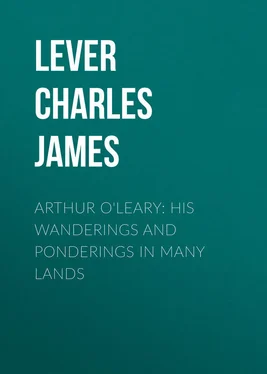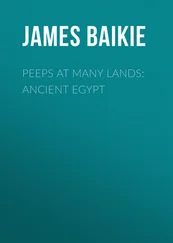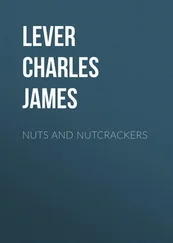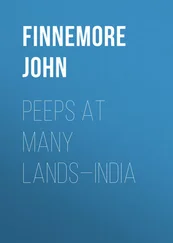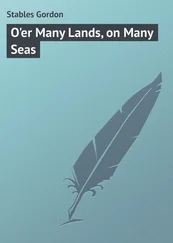Charles Lever - Arthur O'Leary - His Wanderings And Ponderings In Many Lands
Здесь есть возможность читать онлайн «Charles Lever - Arthur O'Leary - His Wanderings And Ponderings In Many Lands» — ознакомительный отрывок электронной книги совершенно бесплатно, а после прочтения отрывка купить полную версию. В некоторых случаях можно слушать аудио, скачать через торрент в формате fb2 и присутствует краткое содержание. Издательство: Иностранный паблик, Жанр: literature_19, foreign_antique, foreign_prose, на английском языке. Описание произведения, (предисловие) а так же отзывы посетителей доступны на портале библиотеки ЛибКат.
- Название:Arthur O'Leary: His Wanderings And Ponderings In Many Lands
- Автор:
- Издательство:Иностранный паблик
- Жанр:
- Год:неизвестен
- ISBN:нет данных
- Рейтинг книги:3 / 5. Голосов: 1
-
Избранное:Добавить в избранное
- Отзывы:
-
Ваша оценка:
- 60
- 1
- 2
- 3
- 4
- 5
Arthur O'Leary: His Wanderings And Ponderings In Many Lands: краткое содержание, описание и аннотация
Предлагаем к чтению аннотацию, описание, краткое содержание или предисловие (зависит от того, что написал сам автор книги «Arthur O'Leary: His Wanderings And Ponderings In Many Lands»). Если вы не нашли необходимую информацию о книге — напишите в комментариях, мы постараемся отыскать её.
Arthur O'Leary: His Wanderings And Ponderings In Many Lands — читать онлайн ознакомительный отрывок
Ниже представлен текст книги, разбитый по страницам. Система сохранения места последней прочитанной страницы, позволяет с удобством читать онлайн бесплатно книгу «Arthur O'Leary: His Wanderings And Ponderings In Many Lands», без необходимости каждый раз заново искать на чём Вы остановились. Поставьте закладку, и сможете в любой момент перейти на страницу, на которой закончили чтение.
Интервал:
Закладка:
“No; it’s a Schenk Haus, I suppose,” replied I.
“Yes, to be sure, it is a Schenk Haus, but it’s the resort only of smugglers, and those connected with their traffic. Every man about you, and there are, as you see, some seventy or eighty, are all, either sea-faring folks, or landsmen associated with them, in contraband trade.”
“But how is this done so openly? the house is surely known to the police.”
“Of course, and they are well paid for taking no notice of it.”
“And you?”
“Me! Well, I do a little that way too, though it’s only a branch of my business. I’m only Dirk Hatteraik, when I come down to the coast: then you know a man doesn’t like to be idle; so that when I’m here, or on the Bretagny shore, I generally mount the red cap, and buckle on the cutlass, just to keep moving; as when I go inland, I take an occasional turn with the gypsy folk in Bohemia, or their brethren, in the Basque provinces. There’s nothing like being up to every thing – that’s my way.”
I confess I was a good deal surprised at my companion’s account of himself, and not over impressed with the rigour of his principles; but my curiosity to know more of him, became so much the stronger.
“Well,” said I, “you seem to have a jolly life of it; and, certainly a healthful one.”
“Aye, that it is,” replied he quickly. “I’ve more than once thought of going back to Kerry, and living quietly for the rest of my days, for I could afford it well enough; but, somehow, the thought of staying in one place, talking always to the same set of people, seeing every day the same sights, and hearing the same eternal little gossip about little things, and little folk, was too much for me, and so I stuck to the old trade, which I suppose I’ll not give up now as long as I live.”
“And what may that be?” asked I, curious to know how he filled up moments snatched from the agreeable pursuits he had already mentioned.
He eyed me with a shrewd, suspicious look, for above a minute, and then, laying his hand on my arm, said —
“Where do you put up at, here in Antwerp?”
“The St. Antoine.’”
“Well, I’ll come over for you to-morrow evening about nine o’clock; you’re not engaged, are you?”
“No, I’ve no acquaintance here.”
“At nine, then, be ready, and you’ll come and take a bit of supper with me; and, in exchange for your news of the old country, I’ll tell you something of my career.”
I readily assented to a proposal which promised to make me better acquainted with one evidently a character; and after half an hour’s chatting, I arose.
“You’re not going away, are you?” said he. “Well, I can’t leave this yet; so I’ll just send a boy, to show you the way to the ‘St. Antoine.’”
With that, he beckoned to a lad at one of the tables, and addressing a few words in Flemish to him, he shook me warmly by the hand: the whole room rose respectfully as I took my leave, and I could see, that “Mr. O’Kelly’s friend,” stood in no small estimation with the company.
The day was just breaking when I reached my hotel; but I knew I could poach on the daylight for what the dark had robbed me; and, besides, my new acquaintance promised to repay the loss of a night’s sleep, should it even come to that.
Punctual to his appointment, my newly-made friend knocked at my door exactly as the cathedral was chiming for nine o’clock.
His dress was considerably smarter than on the preceding evening, and his whole air and bearing bespoke a degree of quiet decorum and reserve, very different from his free-and-easy carriage in the “Fischer’s Haus.” As I accompanied him through the parte-cochère , we passed the landlord, who saluted us with much politeness, shaking my companion, by the hand, like an old friend.
“You are acquainted here, I see,” said I.
“There are few landlords from Lubeck to Leghorn I don’t know by this time,” was the reply, and he smiled as he spoke.
A calèche with one horse, was waiting for us without, and into this we stepped. The driver had got his directions, and plying his whip briskly, we rattled over the paved streets, and passing through a considerable part of the town, arrived at last at one of the gates. Slowly crossing the draw-bridge at a walk, we set out again at a trot, and soon I could perceive, through the half light, that we had traversed the suburbs, and were entering the open country.
“We’ve not far to go now,” said my companion, who seemed to suspect that I was meditating over the length of the way; “where you see the lights yonder – that’s our ground.”
The noise of the wheels over the pavé soon after ceased, and I found we were passing across a grassy lawn in front of a large house, which, even by the twilight, I could detect was built in the old Flemish taste. A square tower flanked one extremity, and from the upper part of this, the light gleamed, to which my companion pointed.
We descended from the carriage, at the foot of a long terrace, which, though dilapidated and neglected, bore still some token of its ancient splendour. A stray statue here and there, remained, to mark its former beauty, while, close by, the hissing splash of water told that a jet d’eau was playing away, unconscious that its river gods, dolphins, and tritons, had long since departed.
“A fine old place once,” said my new friend; “the old chateau of Overghem – one of the richest seignories of Flanders in its day – sadly changed now; but come, follow me.”
So saying, he led the way into the hall, where detaching a rude lantern that was hung against the wall, he ascended the broad oak stairs.
I could trace, by the fitful gleam of the light, that the walls had been painted in fresco, the architraves of the windows and doors being richly carved, in all the grotesque extravagance of old Flemish art; a gallery, which traversed the building, was hung with old pictures, apparently family portraits, but they were all either destroyed by damp or rotting with neglect; at the extremity of this, a narrow stair conducted us by a winding ascent to the upper story of the tower, where, for the first time, my companion had recourse to a key; with this, he opened a low, pointed door, and ushered me into an apartment, at which, I could scarcely help expressing my surprise, aloud, as I entered.
The room was of small dimensions, but seemed actually, the boudoir of a palace. Rich cabinets in buhl, graced the walls, brilliant in all the splendid costliness of tortoise-shell and silver inlaying; bronzes of the rarest kind; pictures; vases; curtains of gorgeous damask covered the windows; and a chimney-piece of carved black oak, representing a pilgrimage, presented a depth of perspective, and a beauty of design, beyond any thing I had ever witnessed. The floor was covered with an old tapestry of Ouden-arde, spread over a heavy Persian rug, into which the feet sank at every step, while a silver lamp, of antique mould, threw a soft, mellow light, around, revolving on an axis, whose machinery played a slow but soothing melody, delightfully in harmony with all about.
“You like this kind of thing,” said my companion, who watched, with evident satisfaction, the astonishment and admiration, with which I regarded every object around me. “That’s a pretty bit of carving there – that was done by Van Zoost, from a design of Schneider’s; see how the lobsters are crawling over the tangled sea-weed there, and look how the leaves seem to fall heavy and flaccid, as if wet with spray. This is good, too; it was painted by Gherard Dow: it is a portrait of himself; he is making a study of that little boy who stands there on the table; see how he has disposed the light, so as to fall on the little fellow’s side, tipping him from the yellow curls of his round bullet head, to the angle of his white sabot.
Читать дальшеИнтервал:
Закладка:
Похожие книги на «Arthur O'Leary: His Wanderings And Ponderings In Many Lands»
Представляем Вашему вниманию похожие книги на «Arthur O'Leary: His Wanderings And Ponderings In Many Lands» списком для выбора. Мы отобрали схожую по названию и смыслу литературу в надежде предоставить читателям больше вариантов отыскать новые, интересные, ещё непрочитанные произведения.
Обсуждение, отзывы о книге «Arthur O'Leary: His Wanderings And Ponderings In Many Lands» и просто собственные мнения читателей. Оставьте ваши комментарии, напишите, что Вы думаете о произведении, его смысле или главных героях. Укажите что конкретно понравилось, а что нет, и почему Вы так считаете.
